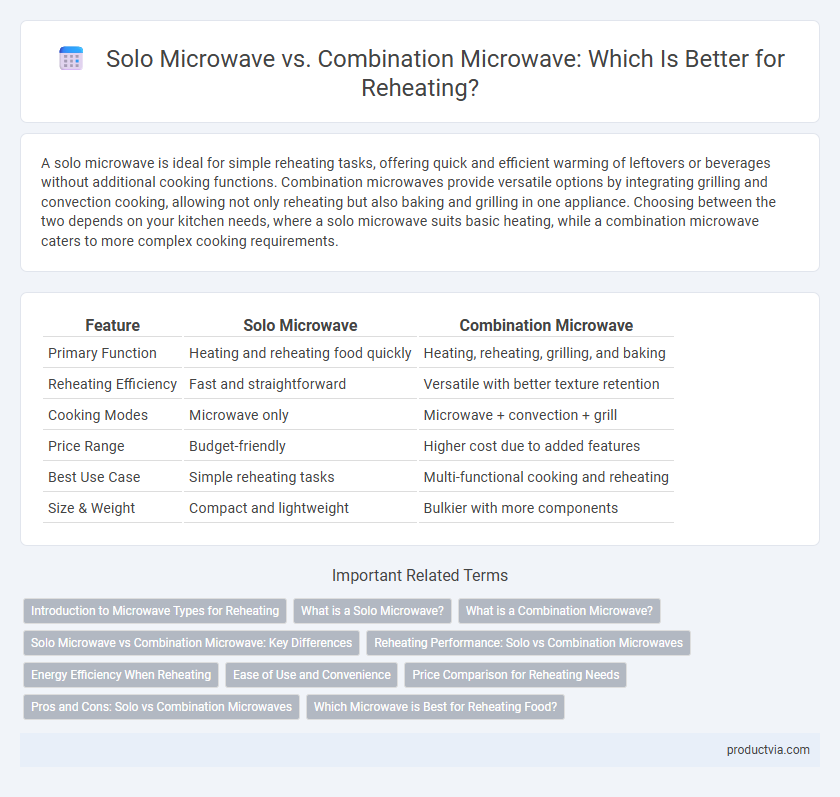A solo microwave is ideal for simple reheating tasks, offering quick and efficient warming of leftovers or beverages without additional cooking functions. Combination microwaves provide versatile options by integrating grilling and convection cooking, allowing not only reheating but also baking and grilling in one appliance. Choosing between the two depends on your kitchen needs, where a solo microwave suits basic heating, while a combination microwave caters to more complex cooking requirements.
Table of Comparison
| Feature | Solo Microwave | Combination Microwave |
|---|---|---|
| Primary Function | Heating and reheating food quickly | Heating, reheating, grilling, and baking |
| Reheating Efficiency | Fast and straightforward | Versatile with better texture retention |
| Cooking Modes | Microwave only | Microwave + convection + grill |
| Price Range | Budget-friendly | Higher cost due to added features |
| Best Use Case | Simple reheating tasks | Multi-functional cooking and reheating |
| Size & Weight | Compact and lightweight | Bulkier with more components |
Introduction to Microwave Types for Reheating
Solo microwaves use microwave radiation solely for reheating and basic cooking, offering fast and energy-efficient warming. Combination microwaves integrate microwave technology with convection or grill modes, allowing more versatile reheating options including browning and crisping. For reheating purposes, solo microwaves provide straightforward, quick heat, while combination microwaves cater to users desiring enhanced texture and flavor in reheated food.
What is a Solo Microwave?
A solo microwave is a standard microwave oven designed primarily for reheating and simple cooking tasks, featuring microwave radiation without additional heating elements like grills or convection fans. It offers quick and energy-efficient reheating by directly penetrating food, making it ideal for defrosting and warming leftovers. Solo microwaves are generally more affordable and compact compared to combination models, which include grilling or baking functions.
What is a Combination Microwave?
A combination microwave integrates both microwave and convection cooking, allowing users to reheat food quickly with microwaves and also bake or grill using convection heat. This dual-function design offers greater versatility compared to solo microwaves, which use microwave radiation solely for reheating, without browning or crisping capabilities. Combination microwaves provide efficient reheating while preserving texture and flavor, making them ideal for diverse cooking needs.
Solo Microwave vs Combination Microwave: Key Differences
Solo microwaves are designed primarily for reheating, defrosting, and simple cooking tasks, offering faster and more energy-efficient heating due to their focused microwave technology. Combination microwaves integrate microwave and convection oven functions, allowing for reheating alongside grilling and baking, providing versatile cooking options but often at a higher cost and longer cooking times. Choosing between a solo and combination microwave depends on the need for straightforward reheating versus multi-functional cooking capabilities.
Reheating Performance: Solo vs Combination Microwaves
Solo microwaves deliver efficient reheating with straightforward microwave heating, ideal for simple tasks like warming leftovers or beverages. Combination microwaves integrate microwave energy with convection or grill functions, enhancing reheating performance by providing more even heating and crisp textures. For diverse reheating needs involving varying food textures, combination microwaves offer superior versatility and improved culinary results.
Energy Efficiency When Reheating
Solo microwaves consume less energy during reheating due to their simpler design and function, making them more energy-efficient for basic tasks. Combination microwaves, which integrate convection and grill features, tend to use more power as they heat food more evenly and quickly, offsetting longer cooking times. Choosing a solo microwave is ideal for users prioritizing energy savings during reheating, while combination models offer enhanced versatility at the cost of increased energy use.
Ease of Use and Convenience
Solo microwaves offer a straightforward user experience with basic reheating functions, making them highly convenient for quick and simple use. Combination microwaves provide versatility by integrating grilling and convection features, but their more complex settings may require additional learning time. For ease of use and daily reheating convenience, solo microwaves often deliver faster and more intuitive operation.
Price Comparison for Reheating Needs
Solo microwaves typically cost less than combination microwaves, making them a budget-friendly choice for basic reheating tasks. Combination microwaves include additional features like grilling and convection, which increase the price but offer versatile cooking options. For straightforward reheating needs, a solo microwave provides an economical and efficient solution without the higher investment required by combination models.
Pros and Cons: Solo vs Combination Microwaves
Solo microwaves offer simplicity and cost-effectiveness, providing efficient reheating with basic microwave functions, making them ideal for users with straightforward cooking needs. Combination microwaves combine microwave heating with grilling or convection features, allowing faster reheating and enhanced cooking versatility but typically come at a higher price and larger footprint. While solo microwaves are energy-efficient for reheating tasks, combination microwaves provide better texture and browning, benefiting meals requiring crispness or mixed cooking methods.
Which Microwave is Best for Reheating Food?
Solo microwaves are designed primarily for reheating and cooking simple meals, offering faster heat-up times and energy efficiency, making them ideal for quick food reheating. Combination microwaves provide versatile cooking options by integrating grilling and convection functions, which enhance flavor and texture but may result in longer reheating cycles. For primarily reheating purposes, solo microwaves deliver optimal performance and convenience due to their specialized focus on rapid and even heating.
Solo microwave vs Combination microwave for reheating Infographic

 productvia.com
productvia.com